

Arthur Evans. Sir Arthur John Evans FRS[1] (8 July 1851 – 11 July 1941) was an English archaeologist most famous for unearthing the palace of Knossos on the Greek island of Crete and for developing the concept of Minoan civilization from the structures and artifacts found there and elsewhere throughout the eastern Mediterranean.
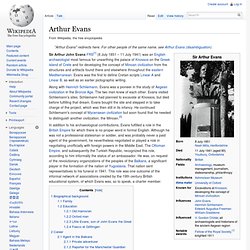
Evans was the first to define Cretan scripts Linear A and Linear B, as well as an earlier pictographic writing. Carl Rogers. Carl Ransom Rogers (January 8, 1902 – February 4, 1987) was an influential American psychologist and among the founders of the humanistic approach (or client-centered approach) to psychology.
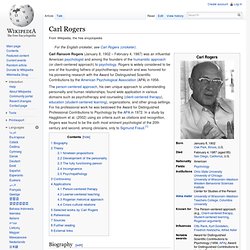
Rogers is widely considered to be one of the founding fathers of psychotherapy research and was honored for his pioneering research with the Award for Distinguished Scientific Contributions by the American Psychological Association (APA) in 1956. The person-centered approach, his own unique approach to understanding personality and human relationships, found wide application in various domains such as psychotherapy and counseling (client-centered therapy), education (student-centered learning), organizations, and other group settings. For his professional work he was bestowed the Award for Distinguished Professional Contributions to Psychology by the APA in 1972. Otto Rank. Otto Rank (April 22, 1884 – October 31, 1939) was an Austrian psychoanalyst, writer, and teacher.
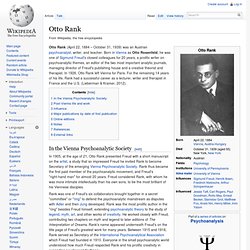
Born in Vienna as Otto Rosenfeld, he was one of Sigmund Freud's closest colleagues for 20 years, a prolific writer on psychoanalytic themes, an editor of the two most important analytic journals, managing director of Freud's publishing house and a creative theorist and therapist. In 1926, Otto Rank left Vienna for Paris. Kurt Lewin. Fritz Perls. Friedrich (Frederick) Salomon Perls (July 8, 1893 – March 14, 1970), better known as Fritz Perls, was a noted German-born psychiatrist and psychotherapist.

Perls coined the term 'Gestalt therapy' to identify the form of psychotherapy that he developed with his wife, Laura Perls, in the 1940s and 1950s. Perls became associated with the Esalen Institute in 1964, and he lived there until 1969. Wilhelm Reich. Wilhelm Reich (/raɪx/; German: [ʀaɪç], 24 March 1897 – 3 November 1957) was an Austrian psychoanalyst, a member of the second generation of psychoanalysts after Sigmund Freud, and one of the most radical figures in the history of psychiatry.

He was the author of several influential books, most notably Character Analysis (1933) and The Mass Psychology of Fascism (1933).[2] His work on character contributed to the development of Anna Freud's The Ego and the Mechanisms of Defence (1936), and his idea of muscular armour – the expression of the personality in the way the body moves – shaped innovations such as body psychotherapy, Fritz Perls's Gestalt therapy, Alexander Lowen's bioenergetic analysis, and Arthur Janov's primal therapy.
His writing influenced generations of intellectuals: during the 1968 student uprisings in Paris and Berlin, students scrawled his name on walls and threw copies of The Mass Psychology of Fascism at the police.[3] Early life[edit] Childhood[edit] B. F. Skinner. Burrhus Frederic (B.
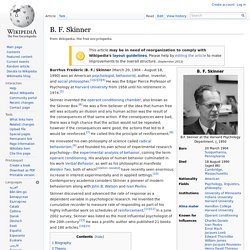
F.) Irving Janis. Irving Lester Janis (May 26, 1918 – November 15, 1990) was a research psychologist at Yale University and a professor emeritus at the University of California, Berkeley most famous for his theory of "groupthink" which described the systematic errors made by groups when making collective decisions.[1][2] Early years[edit] Irving Janis was born on May 26, 1918 in Buffalo, New York.[2] He received a bachelor of science degree from the University of Chicago in 1939, then received a doctorate from Columbia University.[3] Career[edit] During his career, Janis studied decisionmaking in areas such as dieting and smoking.

Stanley Milgram. Stanley Milgram (August 15, 1933 – December 20, 1984) was an American social psychologist.

He conducted various studies and published articles during his lifetime, with the most notable being his controversial study on obedience to authority, conducted in the 1960s during his professorship at Yale.[1] Milgram was influenced by the events of the Holocaust, specifically the trial of Adolf Eichmann, in developing this experiment. His small-world experiment while at Harvard would lead researchers to analyze the degree of connectedness, most notably the six degrees of separation concept.
Biography[edit] Early life[edit] Stanley Milgram was born in 1933 to a Jewish family in New York City,[2] the child of a Romanian-born mother, Adele (née Israel), and a Hungarian-born father, Samuel Milgram.[3][4] Milgram's father worked as a baker to provide a modest income for his family until his death in 1953 (upon which Stanley's mother took over the bakery). Professional life[edit] Solomon Asch. Solomon Eliot Asch (September 14, 1907 – February 20, 1996) was an American Gestalt psychologist and pioneer in social psychology.
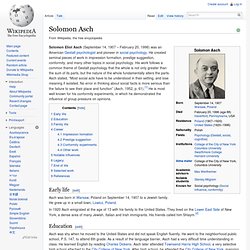
He created seminal pieces of work in impression formation, prestige suggestion, conformity, and many other topics in social psychology. His work follows a common theme of Gestalt psychology that the whole is not only greater than the sum of its parts, but the nature of the whole fundamentally alters the parts. Asch stated, “Most social acts have to be understood in their setting, and lose meaning if isolated. No error in thinking about social facts is more serious than the failure to see their place and function” (Asch, 1952, p. 61).[1] He is most well known for his conformity experiments, in which he demonstrated the influence of group pressure on opinions. Early life[edit] Margaret Singer. Margaret Thaler Singer (1921–2003) was a clinical psychologist and opponent of new religious movements (which she called "cults").

Singer's main areas of research included schizophrenia, family therapy, brainwashing and coercive persuasion. In the 1960s she began to study the nature of new religious movements and mind control, and sat as a board member of the American Family Foundation and as an advisory board member of the Cult Awareness Network. Hippolyte Taine. Portrait of Hippolyte Taine. Taine had a profound effect on French literature; the 1911 Encyclopædia Britannica asserted that "the tone which pervades the works of Zola, Bourget and Maupassant can be immediately attributed to the influence we call Taine's.
" Early years[edit] Title page of 1880 edition of Taine's Voyage aux Pyrénées, first published in 1855. Lewis H. Morgan. Lewis Henry Morgan (November 21, 1818 – December 17, 1881) was a pioneering American anthropologist and social theorist who worked as a railroad lawyer. He is best known for his work on kinship and social structure, his theories of social evolution, and his ethnography of the Iroquois. Interested in what holds societies together, he proposed the concept that the earliest human domestic institution was the matrilineal clan, not the patriarchal family; the idea was accepted by most pre-historians and anthropologists throughout the late nineteenth century.
Also interested in what leads to social change, he was a contemporary of the European social theorists Karl Marx and Friedrich Engels, who were influenced by reading his work on social structure and material culture, the influence of technology on progress. Morgan is the only American social theorist to be cited by such diverse scholars as Marx, Charles Darwin, and Sigmund Freud. Biography[edit] Carl Hovland. Biography[edit] Early life[edit] Carl Iver Hovland was born in Chicago on June 12, 1912.[1] As a youngster in Chicago, he attended the Lloyd School and then completed high school at the Luther Institute. He entered Northwestern University at the age of 16, receiving his B.A. in 1932, and an M.A. the following year.
He then transferred to Yale, where he obtained the Ph.D. in 1936. Except for a three-year research stint in Washington during World War II, Hovland remained associated with Yale the rest of his life, rising rapidly through the academic ranks to a Sterling Professorship at the age of 36. As a child, Hovland had a deep interest in music. Muzafer Sherif. Muzafer Sharif (born Muzaffer Şerif Başoğlu; July 29, 1906 – October 16, 1988) was a Turkish-American social psychologist. He helped develop social judgment theory and realistic conflict theory. Abraham Maslow. Abraham Harold Maslow (/ˈmæzloʊ/[citation needed]; April 1, 1908 – June 8, 1970) was an American psychologist who was best known for creating Maslow's hierarchy of needs, a theory of psychological health predicated on fulfilling innate human needs in priority, culminating in self-actualization.[2] Maslow was a psychology professor at Brandeis University, Brooklyn College, New School for Social Research and Columbia University.
Charles Darwin. Charles Robert Darwin, FRS (/ˈdɑrwɪn/;[1] 12 February 1809 – 19 April 1882) was an English naturalist and geologist,[2] best known for his contributions to evolutionary theory. [I] He established that all species of life have descended over time from common ancestors,[3] and in a joint publication with Alfred Russel Wallace introduced his scientific theory that this branching pattern of evolution resulted from a process that he called natural selection, in which the struggle for existence has a similar effect to the artificial selection involved in selective breeding.[4] Mircea Eliade. Leo Strauss. Leo Strauss (September 20, 1899 – October 18, 1973) was a German–American political philosopher and classicist who specialized in classical political philosophy. He was born in Germany to Jewish parents and later emigrated to the United States. Gustave Le Bon.